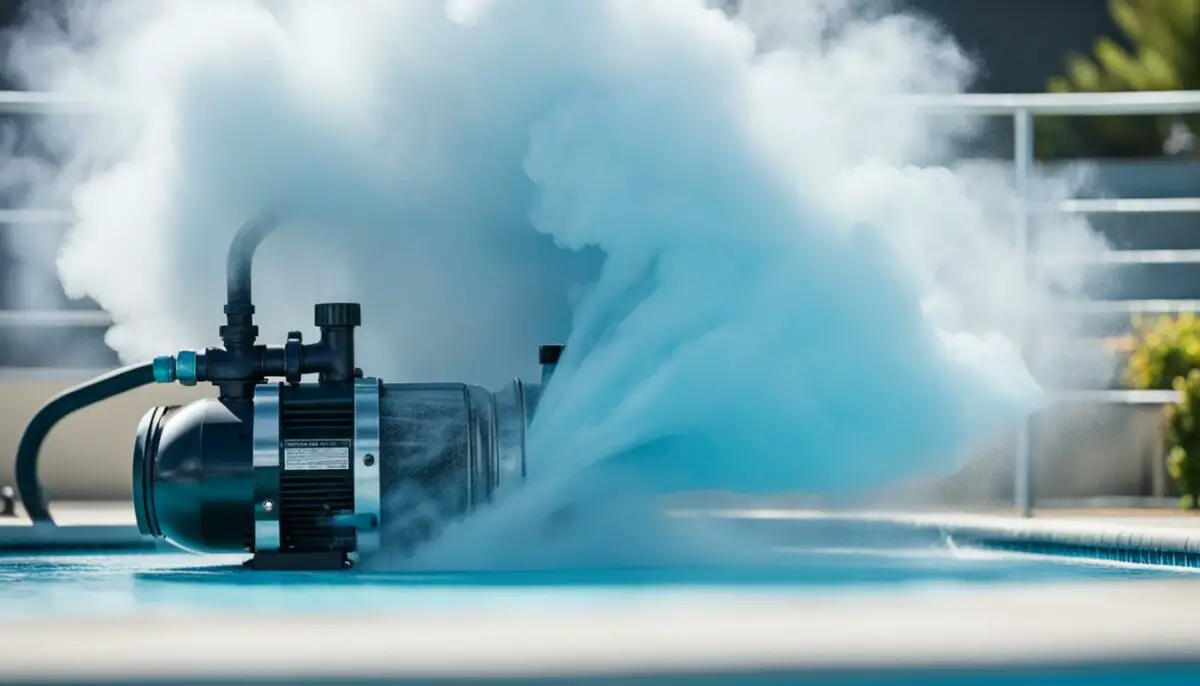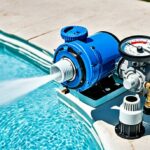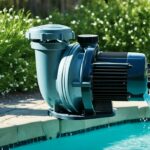Last Updated on 3 months by Francis
If your pool pump keeps blowing the breaker, it can be frustrating and disruptive to your pool maintenance routine. This electrical issue can put a halt to your plans for a refreshing swim or a sparkling clean pool. To help you get back in the water as quickly as possible, we’ve put together some troubleshooting tips and quick fixes to address this problem.
There can be several reasons why your pool pump is causing the breaker to trip. It could be due to water or moisture in the motor, dust and debris inside the motor, bad motor windings, an underrated power circuit or breaker, old wiring, loose wiring terminals, worn pump bearings, a jammed impeller, a blockage in the suction side of the pump, or a faulty motor starting capacitor. Understanding these potential causes will help you identify and resolve the issue effectively.
Contents
Key Takeaways:
- Pool pump breaker trips can be caused by various factors, such as water or moisture in the motor, dust and debris inside the motor, and bad motor windings.
- An underrated power circuit or breaker can also cause the pool pump to trip the breaker.
- Old wiring or loose wiring terminals can contribute to electrical issues and breaker trips. It is essential to have them checked and replaced if necessary.
- Worn pump bearings or a jammed impeller can put additional strain on the motor and lead to breaker trips.
- Regular maintenance and inspections can help prevent pool pump breaker trips and ensure the efficient operation of your pool system.
Top 10 Causes Your Pool Pump Keeps Tripping the Breaker or GFCI
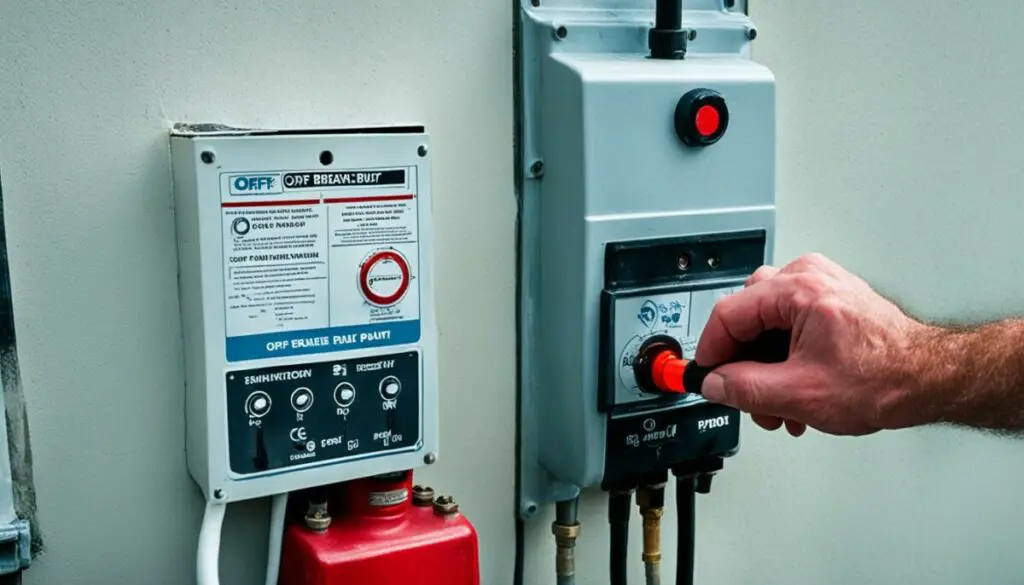
Is your pool pump constantly tripping the breaker or GFCI? This common electrical issue can be frustrating and inconvenient. Understanding the potential causes can help you troubleshoot and resolve the problem effectively. Here are the top 10 reasons why your pool pump may be tripping the breaker or GFCI:
- Water or moisture in the motor: Excessive moisture in the motor can lead to a short circuit and cause the breaker to trip. Make sure the pump is properly sealed and protected from water.
- Dust and debris inside the motor: Accumulated dust and debris can cause the motor to work harder and draw more current, resulting in breaker trips. Regularly clean the motor and surrounding area to prevent this issue.
- Bad motor windings: If the copper windings inside the motor are damaged, it can create a short circuit and trip the breaker. Check the resistance across the motor terminals to determine if the windings are faulty.
- Underrated power circuit or breaker: If the power circuit or breaker is not rated to handle the load of the pump, it can trip frequently. Ensure that the circuit and breaker are appropriately sized.
- Old wiring between the breaker and the pump: Aging or damaged wiring can cause power leakage and result in breaker trips. Have a professional inspect and replace any outdated wiring.
- Loose wiring terminals: Faulty connections at the terminals can lead to electrical issues and breaker trips. Ensure all wiring connections are tight and secure.
- Worn pump bearings: When the pump bearings are worn, the motor may work harder, drawing excess power and causing breaker trips. Check the impeller shaft for smooth rotation to determine if the bearings need replacement.
- Jammed or stuck impeller: A clogged or jammed impeller can strain the motor and lead to breaker trips. Clear any blockages and ensure the impeller spins freely.
- Blockage in the suction side of the pump: When there’s a blockage on the suction side, it can cause excessive strain on the motor and result in breaker trips. Check for debris or obstructions in the skimmer box and pipes.
- Faulty motor starting capacitor: If the motor starting capacitor is defective, it can cause electrical issues and breaker trips. Consult a professional electrician to inspect and replace the capacitor if necessary.
Understanding these top 10 causes of pool pump breaker tripping and GFCI issues will help you troubleshoot and address the problem effectively. By addressing the specific underlying cause, you can ensure that your pool pump operates safely and efficiently.
Water or Moisture in the Motor
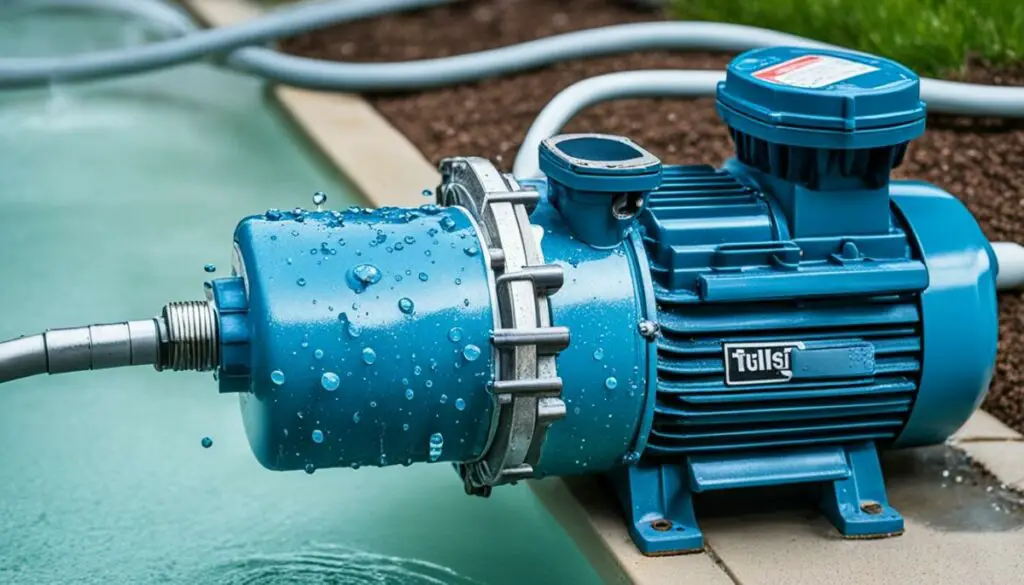
If your pool pump keeps tripping the GFCI breaker or circuit breaker after rain or when it gets wet, the culprit could be water or moisture that has infiltrated the motor or the terminals and wiring. When water enters the motor’s coil, it can create a short circuit and cause the circuit breaker to trip.
To resolve this issue, it’s crucial to allow the pump to dry out completely. Make sure there is no water pooling around the pump when it rains. Keeping the pump covered can also help protect it from the elements and prevent water from entering the motor, minimizing the chances of the problem recurring.
Remember, water or moisture in the motor can lead to repeated breaker trips, so it’s important to address this problem promptly to keep your pool pump running smoothly and avoid potential electrical hazards.
Dust and Debris Getting Inside the Motor
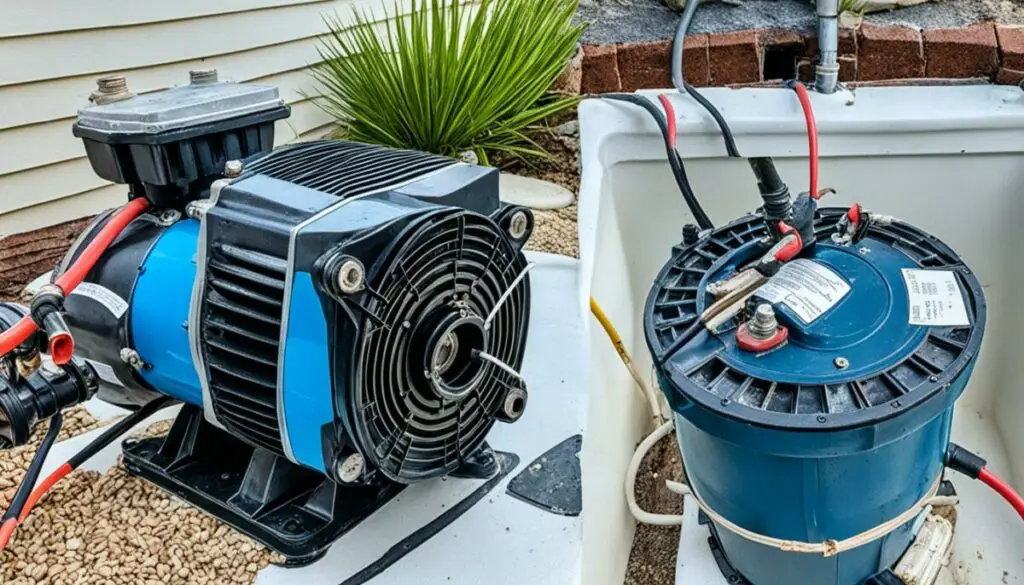
Dust and debris can accumulate inside the motor of your pool pump, causing it to work harder and draw more current. This can lead to the circuit breaker tripping. To address this issue, turn off the pump at the breaker and clean the air vents on the motor housing. Remove any dirt, dust, or debris from around the pump to prevent it from entering the motor. If necessary, you can open up the motor housing and vacuum out any excess dust.
Motor Windings Are Bad
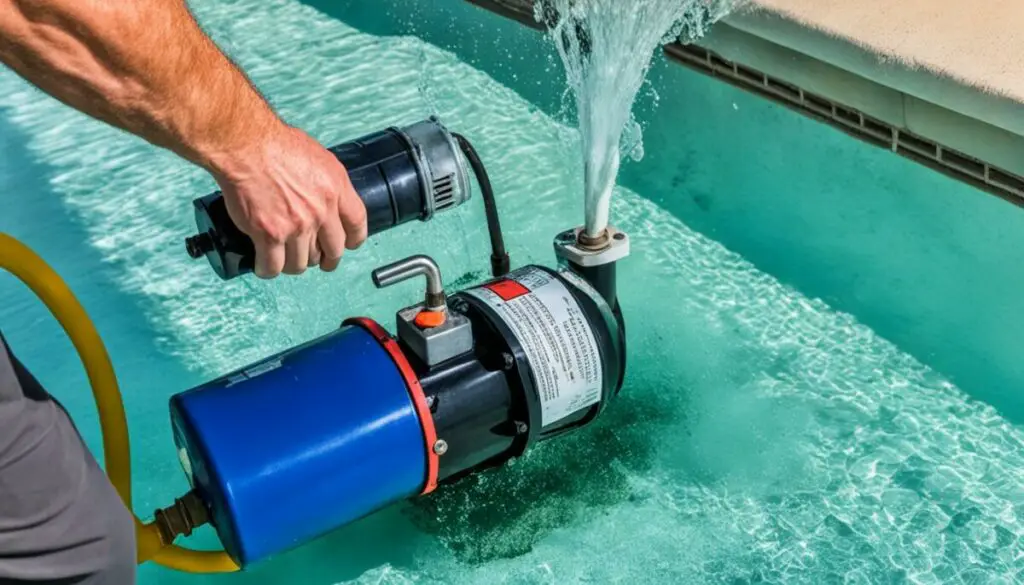
Over time, the copper windings in the pump motor can become damaged. This can result in a short circuit and cause the power breaker to trip. To check if the motor windings are bad, you’ll need a multimeter or Ohm meter to measure the resistance across the motor terminals. If the resistance is very low or nonexistent, it indicates faulty windings. In such cases, it may be necessary to replace the motor or have it repaired by a professional.
A damaged motor winding can be a common cause of pool pump electrical issues. When the windings become compromised, the electrical circuit is disrupted. This disruption can lead to the pool pump repeatedly tripping the breaker, as the damaged windings prevent the motor from functioning properly and safely.
Addressing motor winding issues requires a thorough inspection and testing of the pump’s electrical components. If the resistance across the motor terminals is outside the normal range or nonexistent, it indicates bad windings. In such cases, replacing the motor or seeking professional repair services is recommended to ensure the safe and efficient operation of the pool pump.
“A damaged motor winding can be a common cause of pool pump electrical issues.”
Dealing with motor winding problems can be complex and should be handled by trained professionals. Attempting to repair or replace the motor windings without the necessary knowledge and expertise can result in further damage or even personal injury. It is best to consult a qualified electrician or pool pump technician who can accurately diagnose the issue and provide the appropriate solution.
| Signs of Bad Motor Windings | Solution |
|---|---|
| The pool pump trips the breaker repeatedly. | Replace the motor or seek professional repair services for the windings. |
| The motor makes unusual noises or emits a burning smell. | Inspect the motor for any visible signs of damage or overheating. Replace the motor if necessary. |
| The motor fails to start or runs at a slower speed than usual. | Check the motor windings with a multimeter or Ohm meter. If the readings indicate faulty windings, replace the motor. |
| The motor gets excessively hot during operation. | Ensure proper ventilation around the motor and check for any obstructions. Replace the motor if the heat issue persists. |
“Addressing motor winding issues requires a thorough inspection and testing of the pump’s electrical components.”
Underrated Power Circuit or Breaker to the Pump
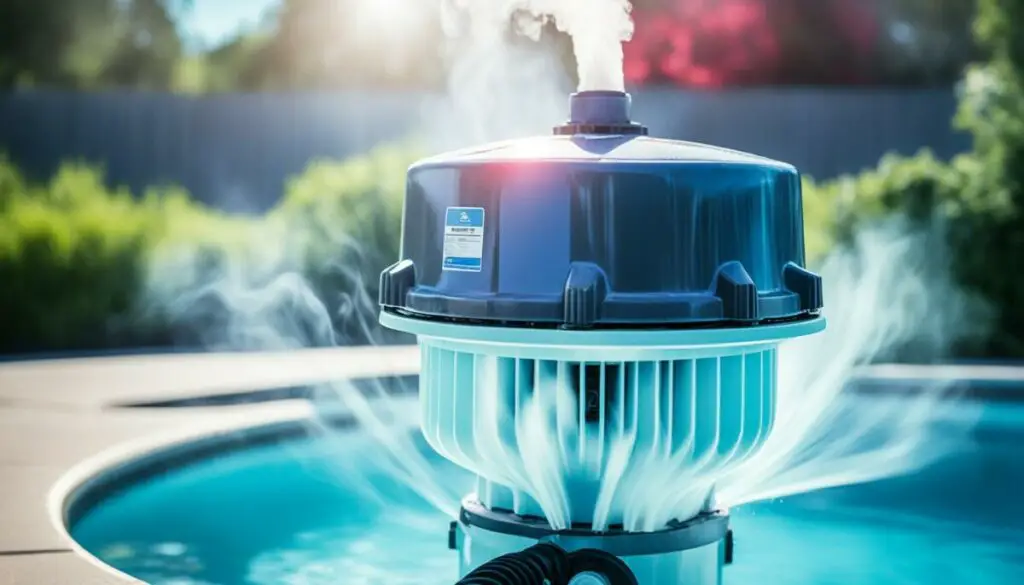
If you recently installed a new pool pump and find that it keeps tripping the breaker, the issue may be due to an underrated power circuit or breaker. It’s important to ensure that the circuit breaker or GFCI (Ground Fault Circuit Interrupter) is rated correctly to handle the power demands of the new pump.
To address this problem, you should first check the amperage rating of the circuit breaker. Compare this rating to the specific power requirements of your pool pump. If the amperage rating of the breaker is lower than what the pump requires, it is likely causing the repeated breaker trips.
In such cases, upgrading to a higher-rated breaker with the appropriate amperage capacity can help prevent repeated breaker trips, ensuring that the pump receives the necessary electrical power to function properly.
Amperage Ratings of Common Circuit Breakers
| Breaker Type | Amperage Rating |
|---|---|
| Standard Circuit Breaker | 15-20 amps |
| GFCI Breaker | 15-50 amps |
| Double-Pole Breaker | 20-60 amps |
It is essential to choose a breaker with an amperage rating that matches or exceeds the power requirements of your pool pump. This will ensure that the breaker can handle the electrical load without tripping, providing a stable power supply for the pump. Consult a professional electrician if you are uncertain about the correct amperage rating or require assistance with upgrading the breaker.
Old Wiring Between the Breaker and the Pump
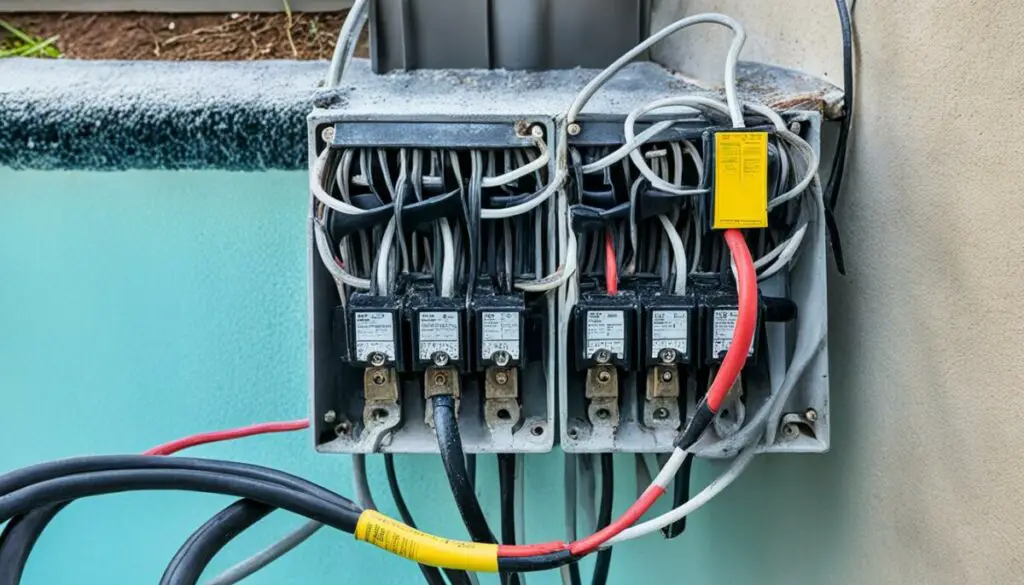
As your pool pump ages, one of the potential causes for electrical issues and breaker trips is old wiring between the breaker and the pump. Over time, the insulation on the wiring can break down, especially if there is moisture present. When insulation deteriorates, power leakage between the wires can occur, leading to electrical problems.
To prevent these issues and ensure the safe operation of your pool pump, it is highly recommended to have an electrician inspect and replace any old or damaged wiring. By upgrading the wiring, you can reduce the risk of power leakage, potential short circuits, and breaker trips.
Upgrading the wiring between the breaker and the pump not only enhances the overall electrical safety of your pool system but also provides more efficient power delivery to the pump, improving its performance and longevity. Regular maintenance and inspection of the wiring are crucial in avoiding inconvenient and potentially costly electrical issues with your pool pump.
Common Signs of Old Wiring:
- Frayed or damaged insulation
- Corroded or loose wiring connections
- Repeated electrical issues or breaker trips
- Moisture or water damage in the wiring area
- Visible signs of wear or aging
Benefits of Upgrading the Wiring:
- Enhanced electrical safety
- Reduced risk of power leakage and short circuits
- Improved performance and efficiency of the pool pump
- Prevention of inconvenient and costly electrical issues
By addressing old wiring between the breaker and the pump, you can safeguard the operation of your pool pump, minimize the risk of electrical issues, and enjoy uninterrupted pool maintenance. Consult a professional electrician to assess your pool’s electrical system and determine if an upgrade is necessary.
| Signs of Old Wiring | Benefits of Upgrading |
|---|---|
| Frayed or damaged insulation | Enhanced electrical safety |
| Corroded or loose wiring connections | Reduced risk of power leakage and short circuits |
| Repeated electrical issues or breaker trips | Improved performance and efficiency of the pool pump |
| Moisture or water damage in the wiring area | Prevention of inconvenient and costly electrical issues |
| Visible signs of wear or aging |
The Wiring Terminals Aren’t Tight
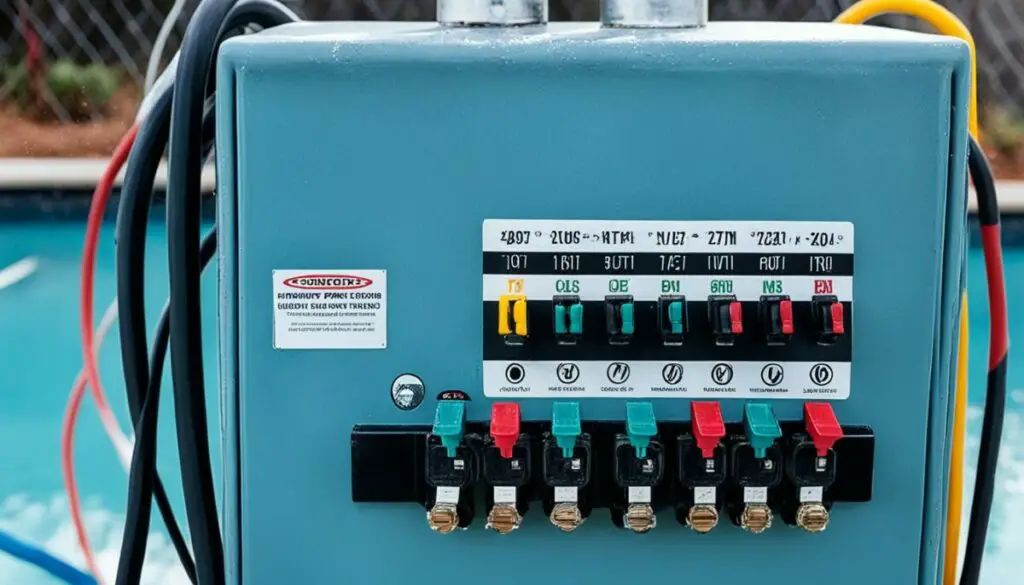
One common cause of electrical issues and breaker trips in pool pumps is loose wiring terminals. When the terminals connecting to the pump, breaker, pool pump timer, and electrical disconnect are not securely tightened, it can lead to poor electrical connections and potential malfunctions.
To prevent these issues, it is crucial to ensure that all the wiring terminals are tight. This includes checking and tightening the screws or connectors that secure the wires to their respective terminals. A loose connection can result in overheating and increased resistance, which can lead to breaker trips or even electrical damage.
If you are not experienced or comfortable working with electrical connections, it is recommended to consult a professional electrician. They have the expertise to properly tighten the wiring terminals, ensuring a safe and reliable electrical connection in your pool pump system.
By taking the time to check and tighten the wiring terminals, you can minimize the risk of electrical issues, improve the overall performance of your pool pump, and prolong its lifespan.
| Benefits of Ensuring Tight Wiring Terminals |
|---|
| 1. Prevents poor electrical connections |
| 2. Reduces the risk of breaker trips |
| 3. Minimizes the potential for electrical damage |
| 4. Improves the performance and efficiency of the pool pump |
| 5. Extends the lifespan of the pool pump |
Ensuring tight wiring terminals is a simple yet important step in maintaining a reliable and safe electrical system for your pool pump. Don’t underestimate the impact of loose connections – take the time to secure the wiring terminals properly and enjoy worry-free pool operation.
Worn Pump Bearings
If your pool pump is experiencing electrical issues, worn pump bearings could be the culprit. When the bearings in the pump become worn, it can cause the motor to work harder and draw more power, leading to breaker trips. To determine if the pump bearings are worn, follow these steps:
- Begin by turning off the pump at the breaker to ensure safety.
- Next, manually rotate the impeller shaft by hand.
- If the impeller shaft does not spin freely or feels rough, it indicates that the pump bearings are worn and need to be replaced.
Replacing the worn bearings is essential to resolve the electrical issue. In some cases, it may be necessary to replace the entire pump if the bearings cannot be replaced individually.
Regular maintenance and lubrication of the pump bearings can help prevent premature wearing and prolong the life of your pool pump. Consult the manufacturer’s guidelines or seek assistance from a professional pool technician for proper maintenance procedures.
Quick Tip:
Proper lubrication of the pump bearings can prevent premature wearing and extend the lifespan of your pool pump.
Jammed or Stuck Impeller
A jammed or stuck impeller can be a common cause of pool pump electrical issues, leading to repeated breaker trips. The impeller plays a crucial role in circulating water through the pump and filter system, but if it becomes jammed or obstructed, it can cause the motor to draw excessive current and overload the circuit.
To address this issue, it is important to inspect the impeller for any debris, leaves, or other blockages that may be causing it to jam. Start by turning off the pump at the breaker and removing the pump basket or strainer cover. Carefully reach inside and check for any foreign objects that may be obstructing the impeller’s movement. Using a flashlight can help you see inside the pump and identify any potential issues.
If there is debris or blockage present, carefully remove it using a pair of pliers or your fingers. Make sure to turn off the power to the pump before attempting any maintenance to avoid injury. Once the impeller is cleared, rotate it by hand to ensure it spins freely and without any resistance.
In cases where the impeller is severely damaged or worn out, it may need to be replaced. Consult the pump’s user manual or contact the manufacturer for guidance on obtaining a suitable replacement impeller. Installing a new impeller can help restore proper water flow and prevent further breaker trips.
Tips to prevent impeller jams:
- Regularly clean the pump basket to prevent debris buildup.
- Install a leaf trap or skimmer socks to catch larger debris before it reaches the pump.
- Keep pool surroundings clean and free from objects that can enter the pump system.
- Inspect and maintain the pool’s water level to prevent the pump from running dry and potential impeller damage.
In summary, a jammed or stuck impeller can be a common cause of pool pump electrical issues. By inspecting and clearing any debris or blockages, you can prevent the impeller from jamming and reduce the risk of repeated breaker trips. Regular maintenance and preventive measures can help ensure the smooth operation of your pool pump and prolong its lifespan.
Blockage in the Suction Side of the Pump
If your pool pump trips the breaker repeatedly, a potential cause could be a blockage on the suction side of the pump. This blockage can create excessive strain on the motor, leading to breaker trips and electrical issues. To address this problem, follow these steps:
- Inspect the skimmer box: Check for any debris or blockages in the skimmer box, including leaves, twigs, or other materials that could impede water flow.
- Examine the pipes: Inspect the pipes between the skimmer box and the suction side inlet of the pump. Look for any obstructions or clogs that may restrict water flow.
- Clean out debris: Remove any debris or blockages found in the skimmer box or pipes. Use a pool skimmer net or a hose to flush out any dirt or debris.
- Ensure proper water flow: After cleaning, ensure that water flows freely through the suction side of the pump. This will alleviate strain on the motor and prevent further breaker trips.
Conclusion
Troubleshooting and fixing a pool pump that keeps blowing fuses or popping the breaker can be a challenging task. It is crucial to address the common causes that can lead to these electrical issues.
Water or moisture in the motor, dust and debris inside the motor, bad motor windings, an underrated power circuit or breaker, old wiring, loose wiring terminals, worn pump bearings, a jammed impeller, blockage in the suction side of the pump, and a faulty motor starting capacitor are some of the potential culprits that can cause your pool pump to experience these problems.
If you are uncertain about handling electrical issues, it is strongly advised to seek the assistance of a professional electrician or pool technician. They have the expertise and knowledge to accurately diagnose and address the problem, ensuring that your pool pump operates safely and efficiently.
FAQ
Why does my pool pump keep blowing the breaker?
Your pool pump may keep blowing the breaker due to various reasons such as water or moisture in the motor, dust and debris getting inside the motor, bad motor windings, an underrated power circuit or breaker, old wiring between the breaker and the pump, loose wiring terminals, worn pump bearings, a jammed or stuck impeller, a blockage in the suction side of the pump, or a faulty motor starting capacitor.
What should I do if my pool pump trips the breaker after rain or when it gets wet?
If your pool pump trips the breaker after rain or when it gets wet, the issue may be caused by water or moisture getting into the motor or the terminals and wiring. To fix this, let the pump dry out completely and ensure there is no water pooling around it when it rains. Consider covering your pool pump to protect it from the elements.
How do I address dust and debris getting inside the motor of my pool pump?
To address dust and debris inside the motor, turn off the pump at the breaker and clean the air vents on the motor housing. Remove any dirt, dust, or debris from around the pump to prevent it from entering the motor. If necessary, open up the motor housing and vacuum out any excess dust.
What should I do if the motor windings of my pool pump are bad?
If the motor windings of your pool pump are bad, you’ll need a multimeter or Ohm meter to measure the resistance across the motor terminals. If the resistance is very low or nonexistent, it indicates faulty windings. It may be necessary to replace the motor or have it repaired by a professional.
What should I check if I’ve recently installed a new pool pump and it keeps tripping the breaker?
If you’ve installed a new pool pump and it keeps tripping the breaker, it is possible that the circuit breaker or GFCI is underrated for the power demands of the new pump. Check the amperage rating of the circuit breaker and ensure it matches the requirements of the pump. Upgrading to a higher-rated breaker may be necessary.
How can I address electrical issues due to old wiring between the breaker and the pump?
If you suspect electrical issues due to old wiring, it is recommended to have an electrician inspect and replace any old or damaged wiring between the breaker and the pump. This will help prevent electrical issues and breaker trips.
What should I do if the wiring terminals for my pool pump are loose?
To address loose wiring terminals, ensure that all wires connecting to the pump, breaker, pool pump timer, and electrical disconnect are tight. If you are not experienced in handling electrical connections, it is best to have an electrician check and tighten the terminals for you.
How do I know if the pump bearings of my pool pump are worn?
To check if the pump bearings are worn, turn off the pump at the breaker and manually rotate the impeller shaft. If the shaft does not spin freely, it indicates worn bearings. Replacing the bearings or the entire pump may be necessary to resolve the issue.
What should I do if the impeller of my pool pump is jammed or stuck?
If the impeller of your pool pump is jammed or stuck, inspect it for any debris or blockages that may be causing it to jam. Clearing out the impeller and ensuring it spins freely should resolve the issue and prevent further breaker trips.
How can I address a blockage in the suction side of my pool pump?
To address a blockage in the suction side of your pool pump, check for blockages in the skimmer box and the pipes between the skimmer box and the suction side inlet of the pump. Cleaning out any debris and ensuring proper water flow should alleviate the strain on the motor and prevent breaker trips.
What should I do if my pool pump keeps blowing fuses or popping the breaker?
If your pool pump keeps blowing fuses or popping the breaker, it is recommended to consult a professional electrician or pool technician to ensure your pool pump operates safely and efficiently.

